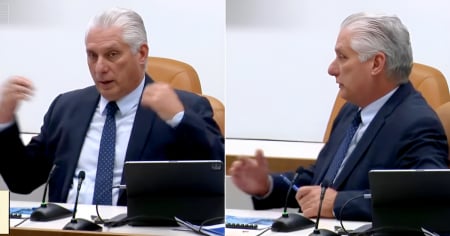The Cuban government has strongly renewed its rhetoric against the so-called "intermediaries" in the economy, blaming them for the rise in prices and inflation.
In the latest session of the Council of Ministers, the Minister of Economy, Joaquín Alonso Vázquez, blamed these actors for profiting throughout the supply chain and announced measures to “break those chains,” marking another chapter in the ongoing narrative of seeking external culprits for their structural shortcomings.
This new statement, broadcast by the National Television News (NTV), comes amid an intensification of state control over the informal economy, a punitive campaign that has included more than 3,300 arrests and legal proceedings in just the past few months, according to official data.
The narrative against intermediaries has been a constant of the regime, but in 2025 it reaches a new peak, integrating police operations, administrative measures, and an ideological campaign orchestrated by the Communist Party.
An official narrative that has been repeated for years
The criminalization of informal trade and self-employment is not new. As early as 2020, Miguel Díaz-Canel called to “confront coleros and resellers” as part of a “socialist control strategy.”
In Guantánamo, that same year, over 200 criminal cases were opened for alleged economic crimes related to scarcity and hoarding. In Holguín, just in 2022, 900 fines were imposed on resellers and hoarders.
More recently, Prime Minister Manuel Marrero Cruz advocated for applying a "hard hand with legal correspondence", demanding exemplary trials for those who engage in resale or informal trade practices.
All of this happens under the umbrella of a campaign by the Communist Party against “illegal activities and crime” which, in practice, translates into increased repression against citizens trying to survive in an environment of deep crisis.
Monreal dismantles the official narrative
The Cuban economist Pedro Monreal provided a critical analysis of the recent council of ministers, questioning the use of empty concepts such as “reinforcement of measures” without data to support a real change.
In a thread on X (formerly Twitter), Monreal accused the government of resorting to "triumphalist verbiage" and replacing macroeconomic policies with an unfounded ideological narrative.
"The highest price increases are in agricultural products. There are many intermediaries," Monreal cited as an example of an official and simplistic explanation that masks the state's inefficiency in increasing production and ensuring supply.
"The official incompetence drives them to search for scapegoats and to impose administrative measures," he stated.
The economist also denounced the “economic gatopardismo” of the “new currency allocation mechanism,” which, despite appearing to change, essentially perpetuates centralized control and the arbitrary designation of winners and losers in the market.
Uncontrolled inflation and propaganda as a response
While the government reports a slight decrease in agricultural inflation—from 5% in January to 1.3% in February—prices remain unaffordable for most Cubans.
In parallel, there is an emphasis on discussions regarding the efficiency of the socialist system, political communication strategies of the Party, and initiatives such as the development of a platform for job management.
However, the real economic context is much more bleak: CEPAL forecasts a further decline in Cuba's GDP in 2025, following two consecutive years of contraction. Exports and imports continue to decrease, and agricultural production, although seemingly improving, does not have a significant impact on supply or prices.
Hold accountable without reforming
The narrative against intermediaries is a smokescreen to avoid confronting the real causes of the crisis: an inefficient economic model, the lack of genuine market openness and the refusal to allow free private initiative.
While structural decisions are not made and informal solutions emerging from society continue to be suppressed, inflation, shortages, and discontent will continue to shape the country's dynamics.
Filed under:
